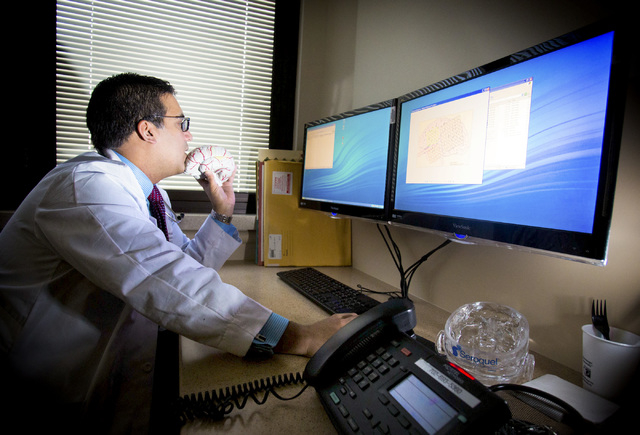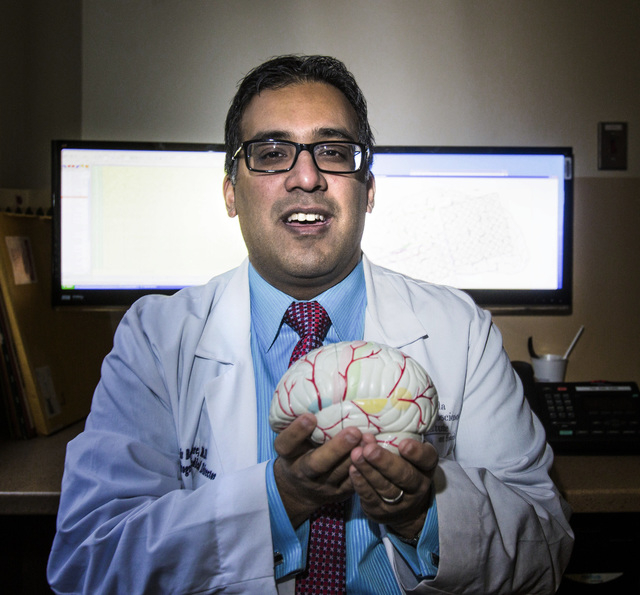Improving treatment, support groups help locals manage epilepsy


When neurologist Samir Bangalore looked around the nation from his home in Chicago in 2007, he was searching for a community in need of help treating epilepsy.
The Northwestern University Medical School and University of Chicago residency program graduate noticed that people suffering from seizure disorders had limited resources in Southern Nevada. Medical help was lacking and so was any sign of support groups.
“Las Vegas was definitely behind the times when it came to treatment of epilepsy,” Bangalore recalls. “When I was looking around the country, I saw that there was such a huge need here — and that need is getting greater all the time.”
Epilepsy is a brain disorder causing recurring seizures or convulsions. As the National Institutes of Health’s Medline Plus website points out, the seizures happen when clusters of nerve cells, or neurons, in the brain send out the wrong signals. During seizures, the site says, people may have strange sensations and emotions. They may also have violent muscle spasms or lose consciousness.
Epilepsy has been linked to brain injury, abnormal brain development and illness, the site says, though in some cases the cause is unknown.
When the disorder is discovered, it often leaves those affected directly or indirectly at a loss for words or any idea of how to deal with its effects.
Bangalore and his wife, Sheila, packed their belongings and headed for Las Vegas, where he now serves as medical director of the Epilepsy Center at Nevada Neurosciences Institute at Sunrise Health.
TREATING EPILEPSY
Today, epilepsy treatment is more widespread locally and so are epilepsy support group meetings, now presented the second Wednesday of each month in Sunrise Hospital’s auditorium.
In addition to medications, complex brain surgeries to treat epilepsy are being performed in Las Vegas with strong success rates. In many cases, patients have fewer seizures; in other instances, patients become seizure-free.
Also, an epilepsy conference is hosted in Las Vegas that attracts respected medical professionals from near and far. The conference has presented for the past six springs; this year’s event will be April 5 at Del Sol High School.
According to the Centers for Disease Control and Prevention, 2.3 million adults and nearly 468,000 children age 17 and younger have epilepsy in the United States. Cities across the nation, including Las Vegas, face significant challenges helping military members who suffer from seizures caused by brain injuries sustained during the wars in Afghanistan and Iraq.
Although great strides have been made in epilepsy treatment locally, building awareness of these services is a continuing need.
“Epilepsy is an interesting condition,” Bangalore says. “When you have a seizure, you may not be able to drive. The disorder is complex and affects the person suffering seizures along with his or her family and friends. The person affected really needs a doctor locally who can help him or her.”
Bangalore says seizures are not always an ongoing condition. Some patients never have more than one seizure, while others experience a lifelong struggle with the disorder.
“It’s important to note that a person doesn’t necessarily have epilepsy because they have a single seizure; epilepsy means that someone is at risk for recurrent seizures,” Bangalore says. “However, it’s also important to diagnose the problem and treat it accordingly, whether it’s through medication or brain surgery.”
Costs for epilepsy medications can reach as high as $1,500 a month. With surgery, the area where the seizures start is isolated and that portion of the brain removed.
“Prior to the surgery, we determine where the seizures start,” Bangalore says. “And once we have pinpointed the affected area, we proceed. It’s almost like a computer is misfiring and if you can take that component out, you have solved the problem.”
Bangalore estimates about 30 brain surgeries for epilepsy have been conducted locally since 2008. He says two-thirds of those patients are now seizure-free.
“It’s rewarding to see patients that have gone through surgery now being able to achieve all of their goals,” Bangalore, 37, says. “For instance, one of my patients invited me to his wedding and said that he built up enough self-esteem to finally start dating only after epilepsy surgery.”
Among the patients whose quality of life has been changed significantly by Bangalore’s work is Alicia Gallegos, who started having seizures after being hit in the head by a golf club when she was 11 years old in Denver.
“I had my first grand mal seizure two weeks later,” says Gallegos, 39. “I was on several different medications all the time and nothing seemed to work.”
Then, in 2010, Gallegos reached an all-time low. She read about a patient with similar problems who was helped by surgery.
“I called Dr. Bangalore and he was sweet as could be,” says Gallegos, a wife and mother of two who works as a food server at a Mimi’s Cafe. On Dec. 10, 2011, Bangalore and neurosurgeon Dr. Kelly Schmidt performed a right temporal lobectomy on Gallegos, removing 5 centimeters of damaged brain matter at Sunrise Hospital.
Gallegos has experienced some setbacks, but her life has changed dramatically since the surgery.
“I was ready for the surgery because of all of the medicines that simply were not working,” she says.
Of Bangalore, she adds: “He’s my angel. I don’t know what I would do without him. My recovery has been great. If I had it to do over again, I’d do it in a second.”
Mike Abrams, who is also a patient of Bangalore, had a left temporal lobectomy in 2009.
“When I was 17 years old while living in Florida I had a seizure in my sleep,” says the 38-year-old Abrams, who is a bartender at The Mirage. “The seizures were new and they were surprising. … No one in my family had any kind of history with seizures.”
In Las Vegas, a local neurologist recommended Bangalore to him.
“We went through a lot of tests and Dr. Bangalore told me that there was a chance that I could have surgery. I was willing to do anything at that point. I wanted to get past the seizures.”
After a minor problem following the surgery was treated, Abrams has been seizure-free. He still takes medications, but says his life is much better now.
SUPPORT GROUP
People with epilepsy can reach out to each other through the local support group.
During each epilepsy support group gathering spearheaded by Nevada Epilepsy Director Danielle Marano, Bangalore and nurse Lisa Frazier answer questions. Family and friends usually attend with those battling seizure disorders. The staff encourages attendees to interact.
Group members range in age from children to adults in their 60s.
Among the members is Angie Jones, who had a right temporal lobectomy in 2002 in Minneapolis. Since her surgery, Jones’ seizures have decreased 99 percent.
“My medication has been cut by half,” Jones says. “I go to the support group because it’s easy to identify with other people who also have epilepsy, or have a loved one with epilepsy.
“My first seizure was in 1975 in Richmond (Calif.) and I did not have the support that I needed. Because of my own past experiences, I know the value of the help that we have found with Dr. Bangalore and his staff.”
Years before Bangalore moved to Las Vegas, an epilepsy support group was started by Barry and Evelyn Kiick, whose son, Harry, has epilepsy. However, when the family moved to Vancouver, Wash., in the early 1990s, the group ceased.
“We used to have our meetings in an empty office,” Evelyn Kiick recalls. “We usually averaged about 12 people at each of our meetings. I’ll never forget that we had a couple of babies that had epilepsy and that was so heartbreaking. We really tried to offer support to the families.”
She especially remembers the first seizure she saw her son have. He was 12.
“It was a tonic clonic (known as a grand mal in the old days) seizure and it happened in the middle of the night,” she says. “He fell out of his bed and I heard him hit the floor. The banging continued as the seizure became more intense. However, there was nowhere to get help in Las Vegas. Our family pediatrician sent us to Phoenix for help.”
Harry Kiick, now 55, has his seizures under control and has a service dog named Sasha. He helps others with the disorder in Portland, Ore., and Spokane, Wash.
For further information on the local epilepsy group, see the Nevada Epilepsy page on Facebook; or call the Nevada Neurosciences Institute at 702-731-8115.
Editor’s note: Mike Henle is a former epileptic who was cured of the disorder through a right temporal lobectomy at Scripps Green Hospital in La Jolla, Calif., in 1994.












